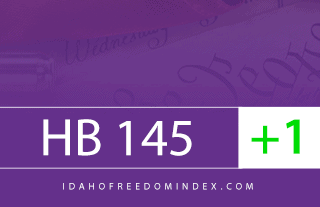


Bill description: House Bill 145 would prevent additional private non-governmental organizations from joining the Public Employee Retirement System of Idaho.
Rating: +1
Analyst’s note: Under existing statutes, non-governmental entities are allowed to join the state pension system, and they have. These include the Idaho Education Association, Idaho School Boards Association, Association of Idaho Cities and Idaho Association of Counties. Current law is not explicit about which non-governmental organizations can be part of the state pension system, except in the definition of an employer, which reads: “‘Employer’ means the state of Idaho, or any political subdivision or governmental entity, provided such subdivision or entity has elected to come into the system. Governmental entity means any organization composed of units of government of Idaho or organizations funded only by government or employee contributions or organizations who discharge governmental responsibilities or proprietary responsibilities that would otherwise be performed by government. All governmental entities are deemed to be political subdivisions for the purpose of this chapter” (Idaho Code 59-1302(15)). House Bill 145 would change the definition to say that only employers who are in compliance with the regulations for a governmental retirement plan as put forth by the IRS can join the system from and after the effective date of the bill. IRS regulations largely prohibit private organizations from joining governmental retirement plan.
Does it increase government redistribution of wealth? Examples include the use of tax policy or other incentives to reward specific interest groups, businesses, politicians, or government employees with special favors or perks; transfer payments; and hiring additional government employees. Conversely, does it decrease government redistribution of wealth?
This bill would prevent additional private organizations from joining PERSI. It would not impact the organizations already in the system, which remains an issue for the Legislature to address in the future. (+1)
Update: This bill was amended 3/15 and this analysis was updated 3/16 to reflect this.


